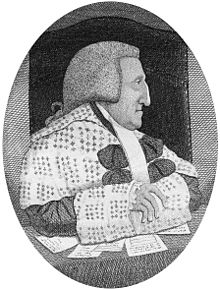David Rae, Lord Eskgrove
| Lord Eskgrove | |
|---|---|

Lord Eskgrove
|
|
| Born | 1724 |
| Died | 1804 (aged 80) |
| Occupation | Scottish judge |
Sir David Rae, Lord Eskgrove, 1st Baronet FRSE (1724–1804) was a Scottish advocate and judge.
He was the son of David Rae of St Andrews, an episcopalian minister, by his wife Agnes, daughter of Sir David Forbes of Newhall. He was educated at the grammar school of Haddington, and at the University of Edinburgh, where he attended the law lectures of John Erskine of Carnock.
He was admitted a member of the Faculty of Advocates on 11 December 1751, and quickly acquired a practice. In 1753 he was retained in an appeal to the House of Lords, which brought him up to London, where he became acquainted with Lord Hardwicke and his son Charles Yorke. He was appointed one of the commissioners for collecting evidence in the Douglas case, and in that capacity accompanied James Burnett to France in September 1764. He was the leading advocate in the Scottish court of exchequer for many years.
He became a Lord of Session on 14 November 1782, succeeding Alexander Boswell, Lord Auchinleck, and a Lord of Justiciary on 20 April 1785, taking the judicial title Lord Eskgrove (from a small estate which he possessed near Inveresk), in place of Robert Bruce of Kennet. Rae was one of the judges who tried William Brodie (died 1788) for robbing the General Excise Office in August 1788, the Rev. Thomas Fyshe Palmer for seditious practices in September 1793, William Skirving and Maurice Margarot for sedition in January 1794, Joseph Gerrald for sedition in March 1794, and Robert Watt and David Downie for high treason in September 1794.
...
Wikipedia
